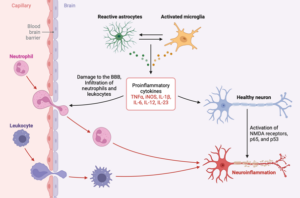To explore the hypothesis that low-grade neuroinflammation in the central nervous system can be part of the cardinal symptoms of ME/CFS.
The overall aim is to explore the hypothesis that low-grade neuroinflammation in the central nervous system can be part of the cardinal symptoms of ME/CFS. Accumulating evidence suggests that ME/CFS patients can suffer from chronic neuroinflammation, the sustained activation of microglia and astrocytes, to strongly influence neurocognitive disturbances, headache, and fatigue and contribute to its progression. A major question is whether inhibition of the inflammatory response has the ability to reverse or slow down its symptoms. Furthermore, for many other brain diseases, such as neurodegenerative disorders, neuroinflammation is emerging as a cause, rather than a consequence, of the pathogenesis.
Neuroinflammation can possibly be monitored in cerebrospinal fluid (CSF) as a result of the inflammatory reaction itself or as secondary markers of cell degradation and impaired cell repair mechanisms. Our study will be the first to systematically measure CNS structural abnormalities in a large ME/CFS case-control study using CSF collection and in-situ measurement of intracranial pressure together with the study of microglia activation by the application of a novel diffusion-based MRI methodology. Added to this will be collected biospecimens to perform extensive state-of-the-art analyses with the ambition to identify diagnostic and prognostic biomarkers.
 Characterize neuroinflammation by CSF composition analyses, monitoring inflammatory markers, as well as markers of cell damage and impaired cell repair mechanisms.
Characterize neuroinflammation by CSF composition analyses, monitoring inflammatory markers, as well as markers of cell damage and impaired cell repair mechanisms.